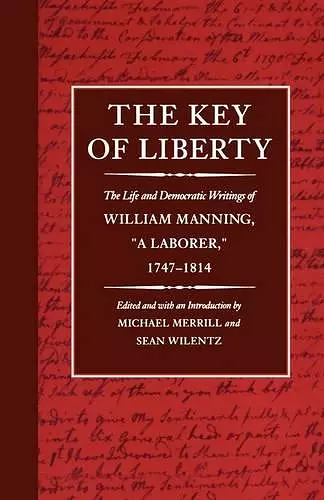The Key of Liberty
The Life and Democratic Writings of William Manning, “a Laborer,” 1747–1814
Michael Merrill editor Sean Wilentz editor
Format:Paperback
Publisher:Harvard University Press
Published:29th Apr '93
Currently unavailable, and unfortunately no date known when it will be back

The recovery of the ideas and experiences of William Manning is a major event in the history of the American Revolutionary era. A farmer, foot soldier, and political philosopher, Manning was a powerful democratic voice of the common American in a turbulent age. The public crises of the infant republic—beginning with the Battle of Concord—shaped his thinking, and his writings reveal a sinewy mind grappling with some of the weightiest issues of the nation’s founding. His most notable contribution was the first known plan for a national political association of laboring men. That plan, and Manning’s broader conclusions, open up a new vista on the popular origins of American democracy and the invention of American politics.
Until now, only a few specialists have referred to any of Manning’s writings—though always with some wonderment at his sophistication—and his place as a pioneering and exemplary American democrat has been largely unacknowledged. In this new and complete presentation of his works, the often arid debates over “republicanism” and “liberalism” in early America come to life in vivid human detail. The early growth of democratic impulses among quite ordinary people—impulses that defy orthodox categories, yet come closer to describing the ferment that led to the repeated political conflicts of the late eighteenth century—is here visible and felt. The Key of Liberty allows us a fuller understanding of the popular responses to the major political battles of the early republic, from Shays’ Rebellion through the election of Thomas Jefferson. It offers, better than any book yet published, a grassroots view of the rise of democratic opposition in the new nation. It sheds considerable light on the popular culture—literary, religious, and profane—of the epoch, with more exactness than previous histories, presenting a new interpretation of early American democracy that is bound to be controversial and much discussed.
The editors have written a lengthy and detailed introduction placing Manning and his writings in broad context. They have also modernized the text for easy use and have included full annotation, making this volume an authoritative contribution to the American Revolution and its aftermath.
This publication of William Manning’s writings—with their populist formulations of the powerful few and the laboring many, as well as their libertarian defenses of individual liberties—is a powerful blow for democracy and freedom. The meticulous scholarship of Michael Merrill and Sean Wilentz has unearthed a jewel in early American thought that still poses a challenge for us in these days of democratic decay. -- Cornel West, Princeton University
The writings of William Manning constitute a major contribution to our understanding of the rise of American democracy, making clear the popular origins of democratic reforms, and the quality of thinking that emerged outside the political elite of the Revolutionary era. Michael Merrill and Sean Wilentz deserve our thanks for rescuing Manning from obscurity, and for brilliantly placing his work in the social and political context of his time. -- Eric Foner, Columbia University
There is much in The Key of Liberty to satisfy students and historians alike, not the least of which is a more sophisticated and compelling version of Merrill’s argument about the moral basis of markets… The Key of Liberty is a fine accomplishment and makes a significant contribution to both historians and their students. * Journal of American History *
Obsessed with the struggle between the few and the many, Manning, a common ‘laborer’ whose writings were collected posthumously, gives a summary of the fiscal and political conditions in Massachusetts and the colonies during the first three presidents’ terms. Manning examined the monetary system in detail along with the interrelationships of interest groups in the young country. Fascinating is the introduction by Merrill (Labor Education Center, Rutgers) and Wilentz (history, Princeton), in which they include an analysis of the religious roots of Manning’s beliefs and arguments. One of Manning’s most penetrating and revealing theories is that popular deference commonly occurs during times of economic prosperity, that in turn breeds a complacency that Manning deplored. The work has generous footnotes and the introduction cogently presents the salient points so the reader can look to the text for Manning’s actual expressions. -- Clay Williams * Library Journal *
The Key of Liberty provides modern-day readers with fresh insight into the thoughts of the 18th-century citizen-soldier and his analysis of the contemporary political scene. * Choice *
ISBN: 9780674502888
Dimensions: unknown
Weight: 290g
240 pages